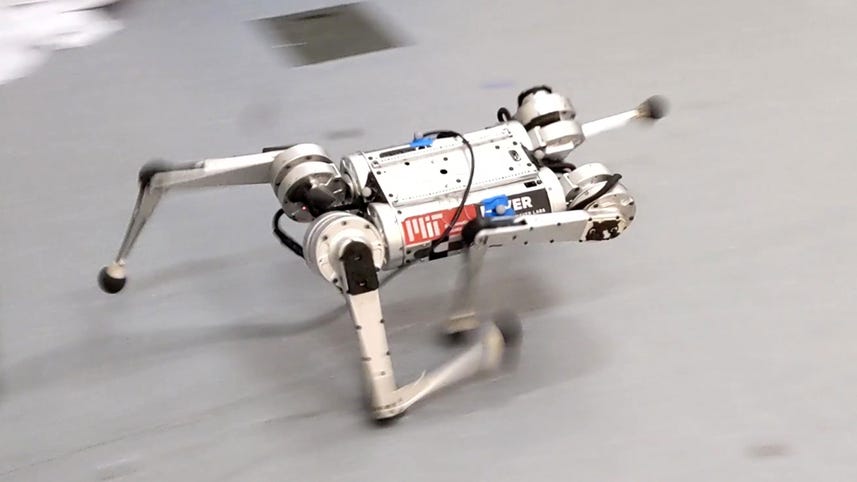
Speaker 1: MIT's mini Cheeta has come one step closer to earning its epic name with a serious speed boost. Thanks to learning in simulation like Neo in the matrix. Don't worry. I talked to people who worked on the project to help explain everything. Let's get into it. After mastering back, flips, hopping and landing from falls. About three years ago, [00:00:30] the mini cheetah's next challenge was to increase speed and robustness using machine learning.
Speaker 2: We can train the robot to learn from its experience very quickly in simulation, and then deploy it in the real world.
Speaker 1: The result is a robot that can run faster over a more diverse set of terrains, but let's just say its style of running has changed a bit in the process.
Speaker 3: Well, we want to give the robot some freedom to decide how it walks because, uh, you know, sometimes it does have [00:01:00] to change that. For example, if it's walking across ice versus walking across buff terrain it's game might need to be different. You
Speaker 2: Know, the power of machine learning is to find things which are going to optimize the objective. And sometimes they might not look pretty to a human when they observe it. They might not also seem intuitive to a human when they observe it, but sometimes those could be magical because humans may not have thought of that way.
Speaker 1: The mini cheetah's unique running style has made it much faster from a top [00:01:30] speed of about five and a half miles per hour, back in 2019 to a top speed of eight to nine miles per hour today, thankfully, that means you'd still have a pretty decent shot of out running it, at least for now.
Speaker 2: One role of robotics is, you know, taking tedious, hard, challenging, dangerous things away from humans so that they can do the things that they really want to do and do it in a safe way.
Speaker 1: The mini cheetah is mainly a research platform for students and faculty from [00:02:00] MIT to advance robotics, hardware and software, but there are some comparable four-legged robots being used for commercial purposes. Right now,
Speaker 3: I, I would point to, I guess like Boston dynamics, uh, antibiotics and, and Ry as we companies with Ry, maybe taking the closest, uh, design approach to the, the MIT mini in terms of the form factor price.
Speaker 1: Maybe it's just my love of sci-fi movies talking, but seeing this thing running is a bit startling. I asked the [00:02:30] researchers from MIT, if they had any thoughts about a potential black mirror style weaponization of this technology,
Speaker 2: It's not just about doing the cool research. It's not just about developing that fancy product. Each technology has hydro users and abusers. You know, if we consider nuclear fusion and nuclear fusion, they can solve all of our energy needs. But on the other hand, they've also led to some very bad things. We do have a role as scientists to educate people [00:03:00] about, you know, the proper use of technology to warn them so that we can really deploy robots for the benefit of humanity. Instead of taking away from humanity,
Speaker 1: The researchers say their next challenge is to use similar machine learning techniques to teach the mini cheetah, to manipulate objects in its environment, making it more useful.